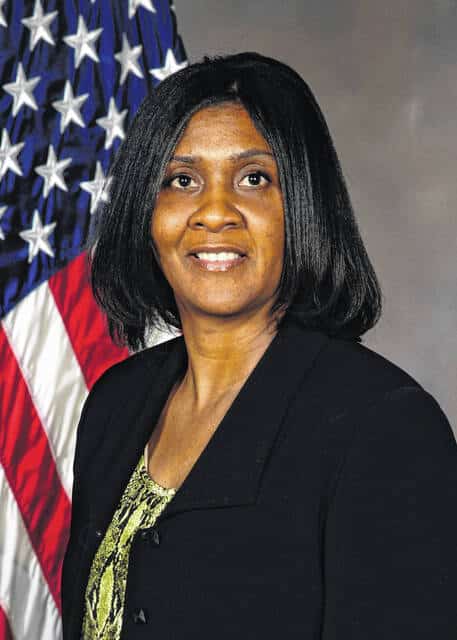
Dr. Charlene M. Holmes-Plump, GS-13, DAF
Provided photo

By Vivian Blevins
Contributing Columnist
Dayton Daily News headlines, Feb. 25, 2022: “‘A Brutal Act of War’ Russia attacks Ukraine: Peace in Europe ‘Shattered.’”
Did you have a collection of plastic or metal soldiers as a kid? Are you still that kid creating dioramas of Civil War scenes or the D Day Invasion of Normandy? Have you moved on to digital games? Hearts of Iron 4 No Step Back?
What about real wargames? One definition at Rand.org indicates, “Wargames are analytical games that simulate aspects of warfare at the tactical, operational, or strategic level. They are used to examine warfighting concepts, train and educate commanders and analysts, explore scenarios, and assess how force planning and positive choices affect campaign outcomes.”
Charlene Holmes-Plump is a full-time senior wargame planner at Wright-Patterson Air Force Base. She has been in that role since 2014. After graduation g from Patterson Cooperative High School in Dayton in 1986, she joined the U.S. Army. The U.S. Air Force was “full up” at the time, and her father, Vietnam War veteran Nathan Robert Holmes, influenced her decision. Her mother was, as Plump puts it, “deliriously happy” because Plump was in a destructive relationship.
Plump knew she needed discipline and in basic training at Fort Jackson, South Carolina, she soon learned the meaning of esprit de corps. She said, “I matured quickly and quit looking at life as just a game, and I didn’t make mistakes I would have made were it not for the military training and education. I met a lot of different people. For example, I met those court-ordered to join the Army or go to jail, and learned that I didn’t have to like them, but I could still get the job done by being a team player and embracing the mantra, ‘United we stand; divided, we fall.’ And I learned that as a woman, I could still carry 50 pounds.”
After advanced training at Fort Jackson as a personnel specialist, Plump was off to Augsburg, Germany, where she spent $100 of her monthly allotment in phone calls home to hear her mother’s voice.
Then it was on to Fort Knox where she was in a personnel control facility handling data on AWOL personnel and processing prisoners who were being discharged from the military.
Then it was time to join the U.S. Air Force Reserves at Wright-Patterson Air Force Base where she served as a personnel specialist and unit deployment manager from 1992-2014.
Plump reports that some “wargames are futuristic. They involve operational concepts that could be used against a foe. We use wargames to prepare strategies and technologies that allows us to possibly win battles against our adversary. As part of a team of 20 at Wright-Patt, we explore what is needed in a particular situation in the European or Pacific Theater to prepare us for an encounter. If we lose in a game, we analyze why. The team explores areas such as the terrain, the politics, the weapons systems, and supply-chain issues.”
Plump is not at liberty to comment on the current war in Ukraine, but says, “I’m not afraid of the decisions the U.S. will make militarily.”
Her son, Jerrell Dixon, recently joined the U.S. Army and also went through basic training at Fort Jackson. Mother Plump indicates, “He made this decision entirely on his own, and I fully support him.” Dixon is now stationed at Fort Campbell, Kentucky.
In conclusion, most of us don’t want war, but with evil always afoot, we must respond to what AP reporters Karmanau, Heintz, and Litvinova recently wrote, “President Vladimir Putin ignored global condemnation and cascading new sanctions as he unleashed the largest ground war in Europe since World War II, and chillingly referred to his country’s nuclear arsenal. He threatened any country trying to interfere with ‘consequences you have never seen.’”
P.S. My thanks, respect, and love to my World War II veteran friends, Marion Adams (1923-2020), Harry Christy (1922-2021), Robert Tweed (1921-2018), Harry Ashburn (1923-Present) and my uncle William Ellis Adams (1919-1991) who after the Beaches of Normandy, the Battle of the Bulge, Dachau, Stalag VII-A, and the Bataan Death March never thought this would happen again in the European theater.
Vivian B. Blevins, Ph.D., a graduate of The Ohio State University, served as a community college president for 15 years in Kentucky, Texas, California, and Missouri before returning to Ohio to teach telecommunication employees from around the country and students at Edison State Community College and to work with veterans. Viewpoints expressed in the article are the work of the author. The Miami Valley Today does not endorse these viewpoints nor the independent activities of the author.


